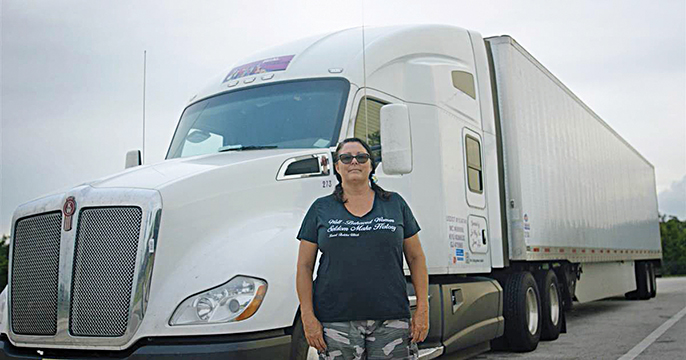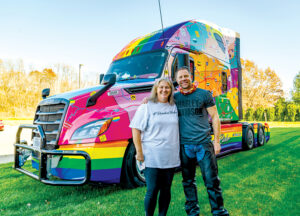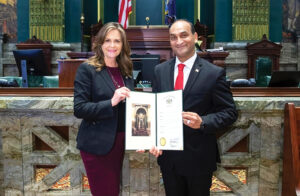LAS VEGAS — When Desiree Wood presented nine action points to address sexual misconduct in trucking during a 2019 listening session with the Federal Motor Carrier Safety Administration (FMCSA) in Dallas, she wasn’t sure how the other truckers would respond.
Wood had started nonprofit, REAL Women in Trucking (RWIT), nearly a decade earlier to speak out against misconduct in trucking in an effort to help other women heal from their past experiences, to give advice and to become a resource for women in the trucking industry.
Instead, she received death threats, Wood said, adding that she discovered many people, both men and women, who were determined to silence her views by digging up personal information in an effort to harm or discredit her.
“I’m the person in the room that nobody wants to hear about my priorities,” Wood said with a laugh. “I have the ones that are very controversial.”
But as she left that room in Dallas, she heard affirmation from an elderly truck driver, a man, who was in a wheelchair.
“I’m so glad you went up there and said that to them,” the driver said to her. “Nobody ever talks about that, and you are so right. It is so past time to have a change in this industry.”
It was then that Wood finally felt all her work was worth it.
“I can’t tell you how much it meant to me for him to say that,” she said. “It’s a big deal.”
As she did then, and every time someone calls her to thank her, Wood said she feels pride in the work she is doing.
“(RWIT) has taken a chunk out of my life, and there are so many days that I just want to say, ‘Why am I doing this? It’s not my problem,’” she said. “Then somebody will call me and say, ‘I just watched your videos. This just happened to me, and I’m so glad I found you and I have somebody to call. Could you help me with this?’ That’s what keeps me going.”
Wood’s advocacy has certainly made an impact. She collected 10,000 signatures on the nine action points she presented to the FMCSA, and after the listening session, the agency added a link on its website for truck drivers to report sexual misconduct in the workplace.
She has also been called on as an expert witness in court cases involving sexual assault.
Recently, Wood said, she’s seen pregnancy discrimination, wage theft and training issues become issues in the trucking community. Accessible and safe truck parking has been a primary issue for her as well since the death of Jason Rivenburg in 2009.
Rivenburg was murdered during a robbery while parked in his truck. His death inspired Jason’s Law, which addresses research and programs to improve safe truck parking, in 2012.
In 2015, Wood started attending the Department of Transportation’s (DOT) truck parking coalition group meetings to educate herself and to speak out. Often, she was the only truck driver present at the meetings, which took place in locations across the U.S. This proved to be a challenge for Wood, as she took time off work and traveled at her own expense to attend the meetings.
“I took off work and I went,” she said. “I went, whether I had to take a train or a cab. It was tough. But it was important to have the drivers’ voice there about this issue. Otherwise, you have a bunch of engineers and lobbyists that have never been inside of a truck. I go to these meetings, and most of the people talking about trucking have never even been near a semi.”
The road hasn’t been easy for the trucker of 15 years. Wood found a rocky start in trucking, dealing with sexual harassment and insufficient training — and she soon noticed that accusations of rape, assault and sexual harassment were not uncommon in some truck driving training fleets.
“When you reported it, you were (often) retaliated against,” she said. You had a target on your back. And in my first year of trying to be an advocate, I had death threats against me. I had people trying to dig up my past.”
Despite being harassed herself, Wood was determined to persevere. After hearing other truckers’ concerns, she created RWIT to speak out about her experiences and help other women through similar situations.
The group has 1,000 paying members, but Wood said she’d rather help others than focus on the membership. Instead, she finds her group partnering with similar ones to promote their mission. The organization has held self-defense classes and raises funds for Truckers Emergency Assistance Responders. In addition, RWIT created its own annual “Queen of the Road” awards for female truck drivers in 2017.
Wood is currently a slip seat driver for BratCat Express, where she shares trucks with other drivers. In the past, she’s spent time as a mentor for training fleets, done less-than-truckload work and spent time as an owner-operator.
“I just did not want to work in an office,” Wood said of her profession. “I came into trucking like a lot of truck drivers did. It was a second chance at restarting your life and reinventing yourself.”
And that’s exactly what she found, both through trucking and through advocacy for women in the industry. Wood said becoming an advocate wasn’t a choice for her; she felt like she had to be outspoken. The role hasn’t come without challenges.
“There’s been a lot of times I just want to quit,” Wood said. “It’s taxed my body, it’s taxed my health, it’s taxed my relationship with my kids.”
Wood said it’s challenging to run a small organization by herself, up against federal corporations and the government. Sometimes she takes breaks to clear her mind; then she returns to RWIT to continue fighting the problems.
“It’s OK to walk away from it and take a break and go do something else to decompress,” she said. “Then go back, get re-energized and try to fight again. We have a new generation of truckers since (I started). A lot of young women of color have entered the trucking industry. Unlike when I entered — I already had grown children and grandchildren — we’re seeing a lot of women who have never had a baby and are encountering new things.”
If no one else cares, Wood said, she does.
When she’s not focused on RWIT or on the road, she’s still transporting herself through other means.
“I love to ride my bicycle,” she said. “I have a really cool beach cruiser with pink and silver flames on it. I absolutely love riding my bike and going to the beach.”
Wood enjoys her “adventure junkie” lifestyle, with a national parks pass in her hand and big views on her mind. She’s a hiker and loves to go to Zion National Park and Bryce Canyon National Park in Utah, Lake Mead near
Las Vegas, or Red Rock Canyon in Colorado.
“I love to take pictures,” she said. “Even if it’s just a short walk, a lot of the time I get so wrapped up in taking pictures. I especially love taking photos of the sunrise and sunset, and I’ve got some beautiful pictures in Jupiter and Lake Worth, Florida, California and even out on the mountains. Even on the road, I love getting up to see the sunrise come up, and I love seeing it go down. I just get this whole thrill every day over that.”
Those sunrises and sunsets will always be a source of peace for Wood, even on the days that are consumed by her driving job, RWIT or other advocacy issues. On those days, she remembers the encouragement she’s been given, and she can fight on.
Hannah Butler is a lover of interesting people, places, photos and the written word. Butler is a former community newspaper reporter and editor for Arkansas Tech University’s student newspaper. Butler is currently finishing up her undergraduate print journalism degree and hopes to pursue higher education. Her work has been featured in at least nine different publications.














